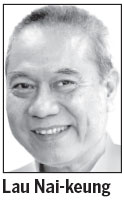Spiral of silence and HK's ruling class
Updated: 2012-12-04 05:53
By Lau Nai-Keung(HK Edition)
|
|||||||||
If a tree falls in a forest and no one is around to hear it, does it make a sound? This is a well-known philosophical thought experiment that raises questions regarding observation and knowledge of reality.
Can something exist without being perceived? The most immediate philosophical topic that the question introduces involves the existence of the tree (and the sound it produces) outside of human perception. If no one is around to see, hear, touch or smell the tree, how could it be said to exist? What is it to say that it exists when such an existence is unknown?
I am no philosopher, but the question above is relevant to modern politics. If a person does not vote, participate in demonstrations, write to newspaper editors, post opinions on Facebook, how can we know what his or her stance is? The government likes to tell us that there is a "silent majority" out there supporting their policies, but like the tree that falls when no one is around, how can we ever know if these supporters really exist or not?
I believe that the government's claim is not entirely unfounded. After all, the Central Policy Unit spends a fortune conducting public opinion polls and it should have grasped a basic understanding of people's mood. Intuitively, people in Hong Kong cannot be that crazy, and it is highly unlikely that they all fall for the radical dissidents' nonsense.

What is happening can be explained by the so-called spiral of silence theory. The spiral of silence is a political science and mass communication theory propounded by the German political scientist Elizabeth Noelle-Neumann. It describes the process by which one opinion becomes dominant when those who perceive their opinion to be in the minority do not speak up, because they fear being isolated from society.
The spiral of silence begins with the threat of isolation. In order to maintain structure in society, a collective cohesion of its members must be constantly ensured by a sufficient level of agreement on values and goals. In order to guarantee agreement and maintain social order, society threatens isolation for those individuals who violate "the consensus".
However, the consensus, in the form of a dominant opinion, may not be statistically representative of the population. Instead, it is usually manufactured. The mass media have an enormous effect on how public opinion is portrayed, and can dramatically affect an individual's perception about where public opinion lies, whether or not that portrayal is factual.
Let's see an example of the process in action. TVB reported that Shiu Sin-por said he is going to monitor and control public opinion (despite the fact that he did not), this was the first step of the production process. The media's favorite commentators then all gave their comments, opinion and analysis based on this false piece of information, making it seemingly real and seemingly important. That was step two. Internet users, while they consumed this piece of misinformation, also reproduced and magnified it in the process. Step three.
In the age of Web 2.0, Internet users are producers and consumers all at once (some scholars call them prosumers), making them ultra-effective. Their task is assisted by a grand narrative, which is that the Communist Party is evil, CY a closet Communist, therefore, naturally also a liar and that defending the core values (read the media manufactured dominant opinion) is cool.
At the end, anything mediated through this network of opinions, or filtered through it, can only point to the conclusion that the establishment is indeed evil. This is the prowess of cultural hegemony.
Hasten to say, cultural hegemony is a vigorously defined concept very different from its common local usage as in "real estate hegemony". In Marxist philosophy, cultural hegemony describes the domination of a culturally diverse society by the ruling class, which manipulate the culture of the society - the beliefs, explanations, perceptions, values, and morals - so that their ruling-class world view is accepted as the universally valid ideology that justifies the social, political, and economic status quo as beneficial for everyone.
If Marx is correct, as he usually is, what we should be asking ourselves is what really is the ruling class in Hong Kong?
The author is a member of the Commission on Strategic Development.
(HK Edition 12/04/2012 page3)